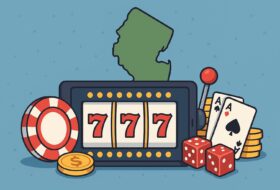
A new bill filed in Alabama aims to battle illegal gambling in the state by strengthening the state’s existing laws. An earlier effort this year to create legal gambling options for state residents failed, as the House and Senate couldn’t agree on the specifics. In the absence of legal gambling, unregulated gaming machines and other illegal or dubiously legal schemes have flourished in the state.
Rep. Matthew Hammett’s HB 41 introduces several amendments to combat unregulated gambling. These include:
- Clearer definitions of gambling and related terminology
- Clarification of what constitutes a “gambling device”
- Increased penalties for illegal gambling, including felony offenses
- License revocation for business owners complicit in illegal gambling
- New rules for the seizure of illegal gambling devices
If passed, HB 41 would take effect on Oct. 1, 2025.
A State in Crisis
Illegal gambling in Alabama has reached a crisis. A 2022 study ordered by Gov. Kay Ivey concluded that the state’s current approach offered “few if any benefits.” It recommended a two-pronged approach, combining the legalization of a few forms of gambling—at least a state lottery—with stricter enforcement action against unregulated gambling. Lawmakers generally seem on board with the idea that something needs to be done, but there’s little consensus about what.
The state is one of the most conservative when it comes to gambling in any form, one of only five that is still without a lottery. The legal options are three Class II (bingo-based) tribal casinos run by the Poarch Band of Creek Indians and three former greyhound racetracks now offering simulcast betting and historical horse racing machines. At one time, electronic bingo machines similar to those at the tribal casinos began appearing at non-tribal bingo parlors, but the state has cracked down and deemed those illegal.
House Speaker Nathaniel Ledbetter is among those most concerned about the threat of illegal gambling. Last year, he emphasized that ridding the state of unlawful gambling is a priority. He backed this year’s gambling expansion proposal, which included a lottery, sports betting, and retail casinos as a solution. However, the disagreements between the Senate and the House resulted in that bill dying on the finish line.
Clearer Definitions of Gambling Devices
HB41 defines gambling activity as risking something of value on the outcome of an event or game not under the person’s control or influence for a chance to win a thing of value if successful. Although similar to traditional definitions, the definition notably omits a reference to “chance” in preference for the language about lack of control or influence. Many gray market gambling schemes in the US attempt to skirt the boundaries of what constitutes “chance,” and the change in phrasing may close such loopholes.
It also provides more precise definitions for various related terms, including “game of chance.” The older definition required that such a game “depends in a material degree on an element of chance.” The new one strikes the words “in a material degree,” such that any game that involves randomness qualifies without placing the burden on prosecutors to prove that the element of chance is “material.”
Under the proposal, illegal gambling devices are subject to seizure and forfeiture. In addition to a $1,000 fine per device, offenders would be responsible for paying any fees related to the seizure and disposal of the machines. Any vehicles and money used in illegal gambling can also be forfeited and either destroyed or used to cover legal costs.
There are still some carve-outs within the bill. These include live pari-mutuel betting in-person on horse or dog races and coin-operated amusement machines (e.g., crane games) that involve an element of skill and do not offer cash as a prize.
Stronger Penalties for Offenders
The proposed bill also adds stiffer penalties for those involved with illegal gambling, increasing it to, at minimum, a Class A misdemeanor. Promotion of illegal gambling would become a Class C felony. For those with previous convictions, illegal gambling becomes a Class B felony.
HB41 also holds business owners and operators accountable. Under the new law, they could be found guilty of an offence even if not fully aware of the illegal gambling on their property, so long as they possess “constructive knowledge” of it and failed to intervene. Any business with an alcohol license that is found guilty of gambling violations could lose its license for one year.
Indirectly Cracking Down on Skill Games
The most common form of gray-market gambling in many US states is the so-called skill machine. There are a few companies making the machines, Pace-o-Matic foremost among them. Typically, these devices resemble slots but add some degree of player choice to circumvent the standard “game of chance” definition of gambling.
Skill games have been controversial in some states, including Pennsylvania, Virginia, and Kentucky. In Pennsylvania, the biggest skill game market, lawmakers can’t agree on how to proceed with the machines. However, the state’s Supreme Court might decide the matter. The highest court has agreed to hear an appeal by state authorities on a Commonwealth Court ruling that the machines are not illegal gambling devices.
Virginia and Kentucky banned the games but faced legal challenges. A few months ago, a Kentucky county judge upheld the state’s ban and rejecting an appeal from businesses and manufacturers. Meanwhile, a bill to legalize skill games in Virginia passed the General Assembly, but the governor rejected it. A separate appeal for the ban is still ongoing.
HB 41 doesn’t make any direct mention of skill games. However, the changes to the definitions may well have been made with such devices in mind. Under the new language, even if the player has decisions to make, a game or event would considered gambling if there’s an element of chance or the outcome is significantly outside the player’s control.





